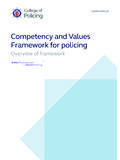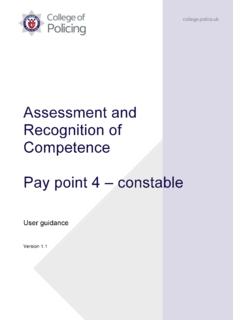Transcription of Flexible working in the police service v2.1
1 Flexible working . IN THE police service . Published May 2013. College of Policing February 2013. All rights reserved. No part of this publication may be reproduced, modified, amended, stored in any retrieval system or transmitted, in any form or by any means, without the prior written permission of College of Policing or its representative. The above restrictions do not apply to police service authorities, which are authorised to use this material for official, non-profit-making purposes only. The College of Policing will provide fair access to learning and development for all its learners and staff. To support this commitment, this document can be provided in alternative formats. To obtain copies or to enquire about the content of this document please contact the Workforce Policy and Strategy Unit on 020 3113 7398. 2. Contents Introduction 6-8.
2 Guidance for Managers 9-13. Guidance for police Staff 14-19. Guidance for police Officers 20-23. Appendices Appendix A Types of Flexible working 24-30. Appendix B Right to request Flexible working police Staff 31. Appendix C police Regulations & Determinations 2003 police Officers 32-33. Appendix D Conditions of service : police Officers Impact of Flexible working 34-35. Appendix E Overview of Legislation 36-39. Appendix F Further Reading 40. Appendix G Flexible working Application Form police Officers 41. Appendix H' Flexible working Application Form FW(A) BIS 42-44. 3. Amendments Version Page Amendment Made Dated 28 Clarification on parental leave May 2013. 4. Acknowledgements This guide is based on the original work and text prepared by Jayne Monkhouse OBE for the police Federation of England and Wales as at December 2012. The final document is the product of the participation, contribution and professional ability of the following and is acknowledged with thanks for their time and patience.
3 Chief Constable A. Hitchcock, ACPO. George Couch College of Policing Parwinder Dale, British Association for Women in Policing Tara Deshpande Home Office Christopher Hanrahan UNISON. Everett Henry College of Policing Jayne Monkhouse OBE police Federation of England and Wales (Equalities Adviser). Neil Pattinson Home Office Ian Rennie police Federation of England and Wales Pauline Weaver City of London police Superintendent Emma Webber, Superintendents Association of England and Wales 5. Introduction This document is for ease of the reader, split into issues relevant for the manager, the police staff applicant and the police officer applicant. The appendices provide further information for all users and useful workplace examples are given throughout the entire document. It is suggested that applicants and managers not only read the section relevant to them, but to read the section relevant to the other party.
4 In this way a more constructive and meaningful conversation is likely to follow. Where it is published, local force policy on Flexible working must be followed. If specific advice is required, managers or applicants should speak with their HR unit. Additional support or advice may also be available from staff association or union representatives. More and more people want or need Flexible working arrangements in order to meet the changing demands in their domestic lives. Flexible working can benefit a wide range of people from those with a caring responsibility through to those who may simply prefer a better work/life balance. One type of shift pattern or the regular 9 to 5 day will not suit every person and, with the changing needs of policing, it no longer meets the operational demands on police Forces. In 2011 nearly 6% of all police officers worked part time; 93% of them were women1.
5 In 2012 police staff represented around 40% of the police service of England and Wales. Women made up 47% of PCSOs and 68%% of police staff Women made up 27% of total police officer strength 24% of all police staff worked part time; 85% of them were women It is generally recognised that women are the principle carer within a family and as the peak age for women to have a baby is 302 and the average age of police officer recruits is 273, caring responsibilities are likely to be a disproportionate issue for female officers and staff in this age range. However, not only do some men have the primary caring role, a larger number of men may share the caring responsibilities with their partner. Likewise the same may be true of staff, who later in their career, take on an adult or child caring role. It is therefore important that employers understand the potential need for Flexible working across the whole workforce.
6 Whilst a caring responsibility is likely to be the main reason supporting application, Flexible working arrangements can be applied to other areas such as part time study or just to have a manageable work life balance. Due consideration must be given to all applications. To retain staff, it is vitally important that the service operates the sort of Flexible working arrangements that allow staff with caring responsibilities to continue their careers as well as ensuring operational resilience on a 24/7 basis. 1. PNB Equal Pay Audit 2011. 2. Office of National Statistics 3. NPIA SEARCH Technical Reports;. 6. The Benefits of Flexible working The benefits for the police service of Flexible working include: retention of valuable officers and staff;. wider diversity of recruits attracted to and retained by the service ;. reduced recruitment and training costs.
7 Flexible working to meet operational demands;. reduced sickness absence; and improved morale and commitment Applied intelligently, Flexible working makes good business sense and managers should view it as a cost effective way of meeting peaks and troughs in policing demand, whilst reducing the wage bill in respect of overtime payments and sickness pay. Increased flexibility results in a more diverse healthy and committed workforce. There is no 'one size fits all' pattern of work-life balance practices. It is important that Forces are able to offer a Flexible menu of working patterns so that officers and staff can come up with something that suits their individual circumstances and that fits in with the policing needs of the Force. Guiding Principles It is of primary importance that Chief Officers should ensure that their commitment to Flexible working is successfully communicated within their Force.
8 Inaccurate perceptions of the impact of Flexible working have resulted in instances where those who work flexibly receive criticism by their peers, who wrongly take the view that they carry the additional workload when their colleague is not at work. Line managers must be supportive of those who work flexibly and ensure that the benefits are made known across the team. There should be a presumption that requests for Flexible working will be accommodated unless there are significant operational or business needs. Although there are significant differences between the Flexible working arrangements for police officers and police staff it would be appropriate for forces to have a policy that covers everyone. Additionally, many Forces have a Flexible working Policy that provides police staff with the same opportunities to work flexibly as is available to police officers.
9 This does not mean that Forces are required to provide officers or staff with particular working arrangements. First and foremost Flexible working provides Forces with a range of options designed to deliver a comprehensive demand-led service to the public. In many instances the needs of the Force and the needs of officers will fit together. 7. Flexible and part-time working A force has revised its policy so that Staff are encouraged to discuss potential options with their line manager prior to submitting a formal application An unrestricted application process for both officers and staff staff can apply for any reason and additionally officers are asked to state whether the require to work flexibly for the statutory caring criteria In the event of a large demand in a particular area, the statutory criteria is used to prioritise applications Statutory time frames are used for both officers and staff A 12 month review period is incorporated into every application.
10 Additionally applications are reviewed during times of organisational change/re-structure. The application form incorporates an impact assessment which covers the points raised within the guidance for managing a Flexible working application. 8. Guidance for Managers Requests for Flexible working should be considered as providing a balance between the needs of the individual and the needs of the Force. There should be a presumption that Flexible working can work unless there are genuine operational or business reasons why it could not. Both parties should be prepared to negotiate, compromise on what they want, and to be creative about possible solutions. I had an unusual request for a member of staff in my Department to reduce her hours and start early. She needed to be at home each afternoon. After discussion we agreed that she didn't have to reduce her hours but that she could start at 4am, leaving at lunchtime.














